不同国家的人的单复数
用英语表示各个国家及国家的人
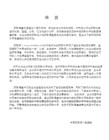
德国人 the Germans a Germans Germans
英国人 the English an Englishman Englishmen
印度人 the Indians an Indian Indians
3.+-n 一般国家以n结尾 例:Russia-Russian Korea-Korean
4.+-ian 一般是国家名以y结尾 例:Italy-Italian
还有很多没规律的,如:Germany(德国)-G复数
中国人 the Chinese a Chinese Chinese
日本人 the Japanese a Japanese Japanese
美国人 the Americans an American Americans
加拿大人 the Canadians a Canadian Canadians
瑞典人 the Swedish a Swede Swedes
瑞士人 the Swiss a Swiss Swiss
澳大利亚人 the Australians an Australian Australians
俄国人 the Russians a Russian Russians
国家和其国家的人之间变化规律
结构:
1.+-ese 比如:China-Chinese Japan-Japonese Portugal-Portuguese
2.+-ish 一般国家名后是-land的 例:England-English Finland-Finnish Sweden-Swedish Spain-Spanish
意大利人 the Italians an Italian Italians
不同国家人单复数

不同国家人单复数引言语言是人类交流的工具,每个国家和地区都有自己独特的语言特点。
其中,不同国家对人名进行单复数的表示方法也存在很大的差异。
本文将探讨一些国家在人名单复数形式上的差异和一些有趣的语言现象。
1. 英语英语作为全球使用最广泛的语言之一,其人名的单复数形式相对简单。
一般情况下,英语中人名的单复数直接在名词后面加上’s’,如名词是以辅音字母+y结尾的,则将’y’变为’ie’再加’s’。
•单数形式:man(男人)、woman(女人)•复数形式:men(男人们)、women(女人们)需要注意的是,这个规则只适用于大多数情况。
一些人名的复数形式可能会有特殊变化,如child(孩子)的复数形式是children(孩子们)。
2. 中文中文是汉语族的语言,人名的单复数形式在语法上并不明显。
一般情况下,中文中没有单复数变化的规则,除非通过上下文来表示,例如通过量词的使用。
•单数形式:李雷、韩梅梅•复数形式:李雷和他的朋友们、韩梅梅和她的家人们需要注意的是,在口语中,为了表示多个人,可以使用“们”的后缀。
如:朋友→朋友们、孩子→孩子们。
法语是一种拉丁语系的语言,人名的单复数形式在法语中也存在一些特殊规则。
大体上,法语中人名的复数形式是在名词后面添加’s’,但也有一些例外。
•单数形式:homme(男人)、femme(女人)•复数形式:hommes(男人们)、femmes(女人们)一些人名的复数形式可能会有音变,或者在词根变化上有所不同,这需要具体根据每个名词的规则进行学习和记忆。
4. 德语德语是一种日耳曼语系的语言,与英语有一定的相似之处。
德语中人名的单复数形式一般是在名词后面添加’s’,但也存在一些例外。
•单数形式:Mann(男人)、Frau(女人)•复数形式:Männer(男人们)、Frauen(女人们)需要注意的是,一些人名的复数形式和单数形式可能变化较大,需要在实际应用中进行学习和记忆。
5. 西班牙语西班牙语是一种拉丁语系的语言,与法语相似,人名的复数形式与单数形式有一些特殊规则。
有关国家名称的中英文及复数变化
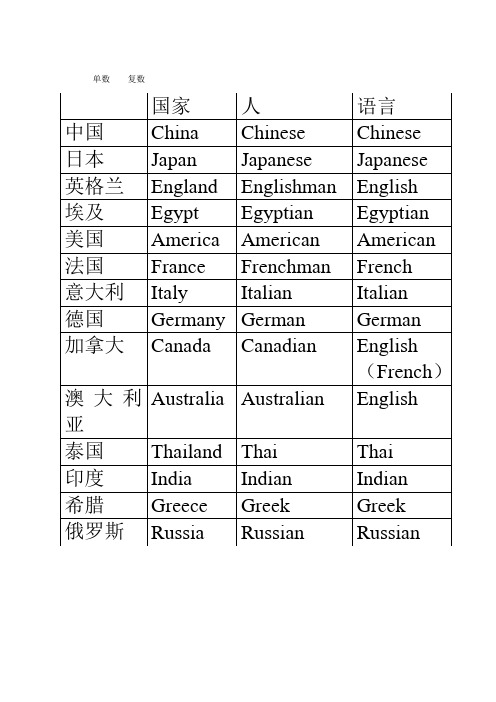
其余的“s”加后面。
1.Sushi is a kind of famous ____ food.(日本)
2.The old man lived alone in ______.(日本)
3.Pyramids made byancient___________are in the east of ______________.(埃及)
国家
人
语言
中国
China
Chinese
Chinese
日本
Japan
Japanese
Japanese
英格兰
England
Englishman
English
埃及
Egypt
Egyptian
Egyptian
美国
America
American
American
法国
France
Frenchman
French
意大利
单数复数国家语言中国chinachinesechinese日本japanjapanesejapanese英格兰englandenglishmanenglish埃及egyptegyptianegyptian美国americaamericanamerican法国francefrenchmanfrench意大利italyitalianitalian德国germanygermangerman加拿大canadacanadianenglishfrenchaustraliaaustralianenglish泰国thailandthaithai印度indiaindianindian希腊greecegreekgreek俄罗斯russiarussianrussian中国人chinesechinese日本人japanesejapanese英国人englishmanenglishmen法国人frenchmanfrenchmen美国人americaamericans德国人germangermans国家人的复数变化口诀
国家名和国家人中英及复数

一、常用国家名,国家人的汇总:American: [ ə'merikən ] a. 美国的n. 美国人America: [ ə'merikə ] n. 美国,美洲Australian: [ ɔ'streiliən ] a. 澳大利亚的n. 澳大利亚人Australia: [ ɔ'streiliə ] n. 澳大利亚Austrian: [ 'ɔ:striən ] n. 奥地利人a. 奥地利的,奥地利人的Austria: [ 'ɔ:striə ] n. 奥地利Brazilian: [ brə'ziljən ] n. 巴西人a. 巴西的Brazil: [ brə'zil ] n. 巴西Canadian: [ kə'neidjən ] a. 加拿大(人)的n. 加拿大人Canada: [ 'kænədə ] n. 加拿大Chinese: [ 'tʃai'ni:z ] a. 中国的n. 汉语,中国人China: [ 'tʃainə ] n. 中国,瓷器Dutch: [ 'dʌtʃ ] a. 荷兰的n. 荷兰人Holland: [ 'hɔlənd ] n. 荷兰English: [ 'iŋgliʃ ] a. 英国的,英国人的n. 英语England: [ 'inglənd ] n. 英格兰,英国Finnish: [ 'finiʃ ] n. 芬兰人Finland: [ 'finlənd ] n. 芬兰French: [ frentʃ ] a. 法国(人)的,法语的n. 法语France: [ frɑ:ns ] n. 法国German: [ 'dʒə:mən ] a. 德国(人)的,德语的n. 德国人,德语Germany: [ 'dʒə:məni ]n. 德国Greek: [ gri:k ] a. 希腊(人)的n. 希腊人,希腊语Greece: [ gri:s ] n. 希腊Indian: [ 'indjən ] a. 印度的n. 印第安人,印度人India: [ 'indjə ] n. 印度Italian: [ i'tæljən ] a. 意大利的n. 意大利人Italy: [ 'itəli ] n. 意大利Japanese: [ dʒæpə'ni:z ] a. 日本的n. 日本人,日语Japan: [ dʒə'pæn ] n. 日本漆; 亮漆日本式漆器日本式物品Korean: [ kə'riən ] n. 韩国人,韩国语文a. 韩国人的,韩国语文的Korea: [ kə'riə, kɔ('riə ] n.韩国Nigerian: [ nai'dʒiəriən ] n. 尼日利亚人Nigeria: [ nai'dʒiəriə ] n. 尼日利亚Norwegian: [ nɔ:'wi:dʒən ] n. 挪威人,挪威语a.挪威的,挪威语的Norway: [ 'nɔ:wei ] n. 挪威Polish: [ 'pɔliʃ ] n. 光泽,优雅,精良v. 擦亮,磨光,推敲Poland: [ 'pəulənd ] n. 波兰Russian: [ 'rʌʃən ] a. 俄国的n. 俄国人,俄语Russia: [ 'rʌʃə ] n. 俄罗斯Spanish: [ 'spæniʃ ] a. 西班牙的n. 西班牙语世界国家(名称)和国家人(名称)中英文对照表Spain: [ spein ] n. 西班牙Swedish: [ 'swi:diʃ ] n. 瑞典人,瑞典语a. 瑞典的,瑞典人的,瑞典语的Sweden: [ 'swi:dn ] n. 瑞典Thai: [ 'tɑ:i( ] n. 泰国人,泰国语Thailand: [ 'tailænd ] n. 泰国Turkish:[ 'tə:kiʃ ] n. 土耳其语a. 土耳其的,土耳其人的Turkey: [ 'tə:ki ] n. 土耳其,火鸡二、单复数形式(一)Chinese和Japanese是单复数同行的词一个中国人是a Chinese, 两者或更多则为Chinese。
国家(英语) 的名词和形容词,人的单复数
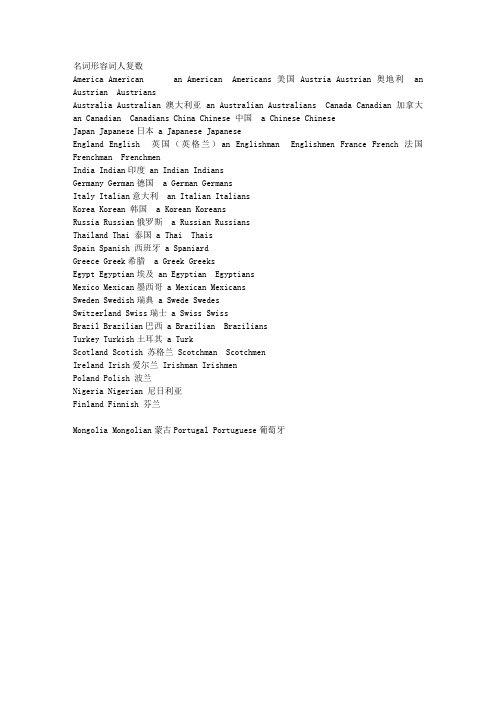
名词形容词人复数 America American an American Americans 美国 Austria Austrian 奥地利 an Austrian Austrians Australia Australian 澳大利亚 an Australian Australians Canada Canadian 加拿大 an Canadian Canadians China Chinese 中国 a Chinese Chinese Japan Japanese 日本 a Japanese Japanese England English 英 国 ( 英 格 兰 ) an Englishman Englishmen France French 法 国 Frenchman Frenchmen India Indian 印度 an Indian Indians Germany German 德国 a German Germans Italy Italian 意大利 an Italian Italians Korea Korean 韩国 a Korean Koreans Russia Russian 俄罗斯 a Russian Russians Thailand Thai 泰国 a Thai Thais Spain Spanish 西班牙 a Spaniard Greece Greek 希腊 a Greek Greeks Egypt Egyptian 埃及 an Egyptian Egyptians Mens Sweden Swedish 瑞典 a Swede Swedes Switzerland Swiss 瑞士 a Swiss Swiss Brazil Brazilian 巴西 a Brazilian Brazilians Turkey Turkish 土耳其 a Turk Scotland Scotish 苏格兰 Scotchman Scotchmen Ireland Irish 爱尔兰 Irishman Irishmen Poland Polish 波兰 Nigeria Nigerian 尼日利亚 Finland Finnish 芬兰 Mongolia Mongolian 蒙古 Portugal Portuguese 葡萄牙
不同国家的人的单复数
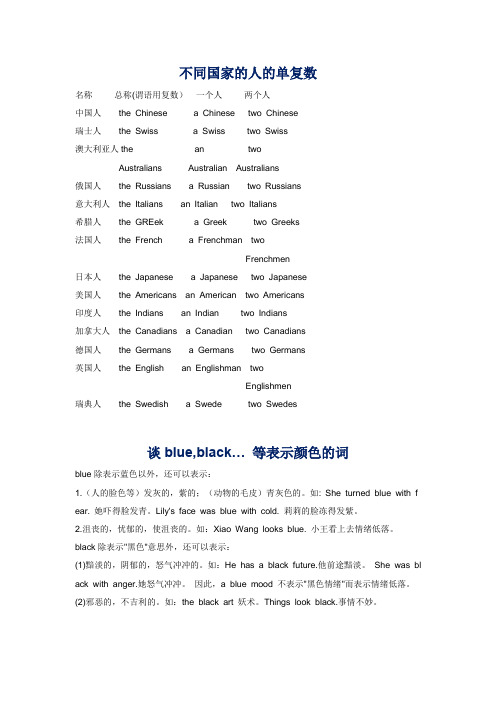
不同国家的人的单复数名称总称(谓语用复数)一个人两个人中国人the Chinese a Chinese two Chinese瑞士人the Swiss a Swiss two Swiss澳大利亚人the an twoAustralians Australian Australians俄国人the Russians a Russian two Russians意大利人the Italians an Italian two Italians希腊人the GREek a Greek two Greeks法国人the French a Frenchman twoFrenchmen日本人the Japanese a Japanese two Japanese美国人the Americans an American two Americans印度人the Indians an Indian two Indians加拿大人the Canadians a Canadian two Canadians德国人the Germans a Germans two Germans英国人the English an Englishman twoEnglishmen瑞典人the Swedish a Swede two Swedes谈blue,black… 等表示颜色的词blue除表示蓝色以外,还可以表示:1.(人的脸色等)发灰的,紫的;(动物的毛皮)青灰色的。
如: She turned blue with f ear. 她吓得脸发青。
Lily's face was blue with cold. 莉莉的脸冻得发紫。
2.沮丧的,忧郁的,使沮丧的。
如:Xiao Wang looks blue. 小王看上去情绪低落。
black除表示"黑色"意思外,还可以表示:(1)黯淡的,阴郁的,怒气冲冲的。
如:He has a black future.他前途黯淡。
名词复数变化规律总结及不规则变化单词总结
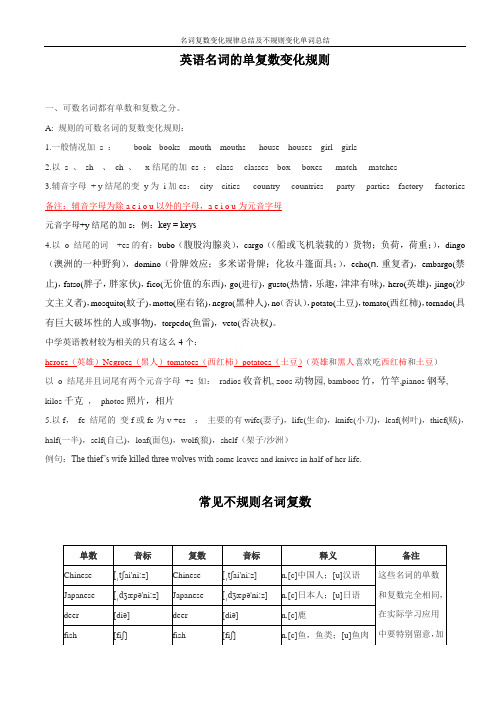
英语名词的单复数变化规则一、可数名词都有单数和复数之分。
A: 规则的可数名词的复数变化规则:1.一般情况加s :book-- books mouth---mouths house---houses girl---girls2.以s 、sh 、ch 、x结尾的加es :class--- classes box----boxes match----matches3.辅音字母+ y结尾的变y为i加es:city---cities country----countries party----parties factory----factories 备注:辅音字母为除a e i o u以外的字母,a e i o u为元音字母元音字母+y结尾的加s:例:key = keys4.以o 结尾的词+es的有:bubo(腹股沟腺炎),cargo((船或飞机装载的)货物;负荷,荷重;),dingo (澳洲的一种野狗),domino(骨牌效应;多米诺骨牌;化妆斗篷面具;),echo(n. 重复者),embargo(禁止),fatso(胖子,胖家伙),fico(无价值的东西),go(进行),gusto(热情,乐趣,津津有味),hero(英雄),jingo(沙文主义者),mosquito(蚊子),motto(座右铭),negro(黑种人),no(否认),potato(土豆),tomato(西红柿),tornado(具有巨大破坏性的人或事物),torpedo(鱼雷),veto(否决权)。
中学英语教材较为相关的只有这么4个:heroes(英雄)Negroes(黑人)tomatoes(西红柿)potatoes(土豆)(英雄和黑人喜欢吃西红柿和土豆)以o 结尾并且词尾有两个元音字母+s 如:radios收音机, zoos动物园, bamboos竹,竹竿,pianos钢琴, kilos千克,photos照片,相片5.以f,fe 结尾的变f或fe为v +es :主要的有wife(妻子),life(生命),knife(小刀),leaf(树叶),thief(贼),half(一半),self(自己),loaf(面包),wolf(狼),shelf(架子/沙洲)例句:The thief’s wife killed three wolves with some leaves and knives in half of her life.常见不规则名词复数1. 英语中有些名词单复数同行,主要有以下几类:A)、某些动物名词B)、某些表示人的名词C)、craft及由-craft构成的名词D)、某些表示数量的名词E)、其他2. 以下这些名词单复数同形:antelope 羚羊,bison 野牛,buffalo 水牛,crab 螃蟹,deer 鹿,fish 鱼,reindeer 驯鹿,sheep 绵羊;Burmese 缅甸人,Cantonese 广东人,Chinese 中国人,counsel 法律顾问,kin 亲属,Japanese 日本人,Swiss瑞士人;aircraft 飞机,craft 飞机,spacecraft 太空船;brance 双,score 二十;series 系列;species 种类;means方法只有复数形式的名词trousers裤子,pants裤子,shorts短裤glasses眼镜,compasses圆规,scales天平,pliers钳子,clips剪子。
名词复数变化规律总结及不规则变化单词总结

英语名词的单复数变化规则一、可数名词都有单数和复数之分。
A: 规则的可数名词的复数变化规则:1.一般情况加s :book-- books mouth---mouths house---houses girl---girls2.以s 、sh 、ch 、x结尾的加es :class--- classes box----boxes match----matches3.辅音字母+ y结尾的变y为i加es:city---cities country----countries party----parties factory----factories 备注:辅音字母为除a e i o u以外的字母,a e i o u为元音字母元音字母+y结尾的加s:例:key = keys4.以o 结尾的词+es的有:bubo(腹股沟腺炎),cargo((船或飞机装载的)货物;负荷,荷重;),dingo (澳洲的一种野狗),domino(骨牌效应;多米诺骨牌;化妆斗篷面具;),echo(n. 重复者),embargo(禁止),fatso(胖子,胖家伙),fico(无价值的东西),go(进行),gusto(热情,乐趣,津津有味),hero(英雄),jingo(沙文主义者),mosquito(蚊子),motto(座右铭),negro(黑种人),no(否认),potato(土豆),tomato(西红柿),tornado(具有巨大破坏性的人或事物),torpedo(鱼雷),veto(否决权)。
中学英语教材较为相关的只有这么4个:heroes(英雄)Negroes(黑人)tomatoes(西红柿)potatoes(土豆)(英雄和黑人喜欢吃西红柿和土豆)以o 结尾并且词尾有两个元音字母+s 如:radios收音机, zoos动物园, bamboos竹,竹竿,pianos钢琴, kilos千克,photos照片,相片5.以f,fe 结尾的变f或fe为v +es :主要的有wife(妻子),life(生命),knife(小刀),leaf(树叶),thief(贼),half(一半),self(自己),loaf(面包),wolf(狼),shelf(架子/沙洲)例句:The thief’s wife killed three wolves with some leaves and knives in half of her life.常见不规则名词复数1. 英语中有些名词单复数同行,主要有以下几类:A)、某些动物名词B)、某些表示人的名词C)、craft及由-craft构成的名词D)、某些表示数量的名词E)、其他2. 以下这些名词单复数同形:antelope 羚羊,bison 野牛,buffalo 水牛,crab 螃蟹,deer 鹿,fish 鱼,reindeer 驯鹿,sheep 绵羊;Burmese 缅甸人,Cantonese 广东人,Chinese 中国人,counsel 法律顾问,kin 亲属,Japanese 日本人,Swiss瑞士人;aircraft 飞机,craft 飞机,spacecraft 太空船;brance 双,score 二十;series 系列;species 种类;means方法只有复数形式的名词trousers裤子,pants裤子,shorts短裤glasses眼镜,compasses圆规,scales天平,pliers钳子,clips剪子。
不同国家的人的单复数
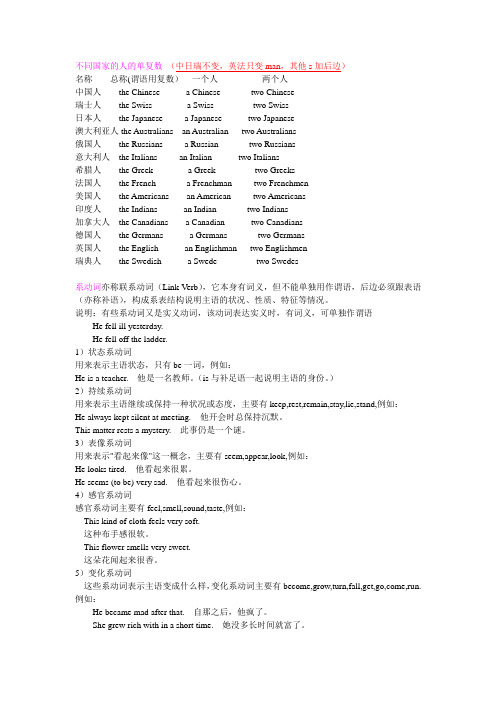
不同国家的人的单复数(中日瑞不变,英法只变man,其他s加后边)名称总称(谓语用复数)一个人两个人中国人the Chinese a Chinese two Chinese瑞士人the Swiss a Swiss two Swiss日本人the Japanese a Japanese two Japanese澳大利亚人the Australians an Australian two Australians俄国人the Russians a Russian two Russians意大利人the Italians an Italian two Italians希腊人the Greek a Greek two Greeks法国人the French a Frenchman two Frenchmen美国人the Americans an American two Americans印度人the Indians an Indian two Indians加拿大人the Canadians a Canadian two Canadians德国人the Germans a Germans two Germans英国人the English an Englishman two Englishmen瑞典人the Swedish a Swede two Swedes系动词亦称联系动词(Link Verb),它本身有词义,但不能单独用作谓语,后边必须跟表语(亦称补语),构成系表结构说明主语的状况、性质、特征等情况。
说明:有些系动词又是实义动词,该动词表达实义时,有词义,可单独作谓语He fell ill yesterday.He fell off the ladder.1)状态系动词用来表示主语状态,只有be一词,例如:He is a teacher.他是一名教师。
(is与补足语一起说明主语的身份。
)2)持续系动词用来表示主语继续或保持一种状况或态度,主要有keep,rest,remain,stay,lie,stand,例如:He always kept silent at meeting.他开会时总保持沉默。
- 1、下载文档前请自行甄别文档内容的完整性,平台不提供额外的编辑、内容补充、找答案等附加服务。
- 2、"仅部分预览"的文档,不可在线预览部分如存在完整性等问题,可反馈申请退款(可完整预览的文档不适用该条件!)。
- 3、如文档侵犯您的权益,请联系客服反馈,我们会尽快为您处理(人工客服工作时间:9:00-18:30)。
不同国家的人的单复数名称总称(谓语用复数)一个人两个人中国人the Chinese a Chinese two Chinese瑞士人the Swiss a Swiss two Swiss日本人the Japanese a Japanese two Japanese澳大利亚人the Australians an Australian two Australians俄国人the Russians a Russian two Russians意大利人the Italians an Italian two Italians希腊人the Greek a Greek two Greeks法国人the French a Frenchman two Frenchmen美国人the Americans an American two Americans印度人the Indians an Indian two Indians加拿大人the Canadians a Canadian two Canadians德国人the Germans a Germans two Germans英国人the English an Englishman two Englishmen瑞典人the Swedish a Swede two Swedes系动词亦称联系动词(Link Verb),它本身有词义,但不能单独用作谓语,后边必须跟表语(亦称补语),构成系表结构说明主语的状况、性质、特征等情况。
说明:有些系动词又是实义动词,该动词表达实义时,有词义,可单独作谓语He fell ill yesterday.He fell off the ladder.1)状态系动词用来表示主语状态,只有be一词,例如:He is a teacher.他是一名教师。
(is与补足语一起说明主语的身份。
)2)持续系动词用来表示主语继续或保持一种状况或态度,主要有keep,rest,remain,stay,lie,stand,例如:He always kept silent at meeting.他开会时总保持沉默。
This matter rests a mystery.此事仍是一个谜。
3)表像系动词用来表示"看起来像"这一概念,主要有seem,appear,look,例如:He looks tired.他看起来很累。
He seems (to be) very sad.他看起来很伤心。
4)感官系动词感官系动词主要有feel,smell,sound,taste,例如:This kind of cloth feels very soft.这种布手感很软。
This flower smells very sweet.这朵花闻起来很香。
5)变化系动词这些系动词表示主语变成什么样,变化系动词主要有become,grow,turn,fall,get,go,come,run. 例如:He became mad after that.自那之后,他疯了。
She grew rich with in a short time.她没多长时间就富了。
6)终止系动词表示主语已终止动作,主要有prove,trun out,表达"证实","变成"之意,例如:The rumor proved false.这谣言证实有假。
The search proved difficult.搜查证实很难。
His plan turned out a success.他的计划终于成功了。
(turn out表终止性结果)十五。
动词搭配1. add to增加,增进add … to把…加进…add up相加add up to总计,所有这一切说明1) I don't think these facts will ________ anything.2) Fifty new books have been ________ the library.3) The music _________ our enjoyment of the film.4) You must have made a mistake when you _______ the bill ________.( add up to, added to, add to, added…up )2. break away from打破,脱离,挣脱,改掉break down出毛病,身体(精神)衰弱,分解,拆开break off暂停,中断break in强行进入,插话break into闯入break into pieces成为碎片break out爆发break up捣碎,驱散,瓦解,学期结束,拆散break through突破1) The criminal managed to break _______ ______ the police and ran into the woods.2) When he heard the news, he broke _______ and cried.3) Don't break ________ while others are speaking.4) Why don't you break ________ for a few minutes and have some coffee?5) When does school break ________?6) After harvest we break _________ the soil with a tool pulled by two oxen.( away from, down, in, off, up, up )3. bring up抚养,呕吐,提出bring about造成bring out拿出,出版bring in引入,引进,挣钱bring back使回想起bring down使下降,使倒下1) The shopkeeper brought his price _________ to only five dollars.2) The school has brought _________ new foreign teachers to teach oral English.3) The song brought ___________ happy memories of our schooldays.4) Do you know what brought ___________ this misunderstanding?5) The kind old man agreed to bring __________ the young orphan.6) We decided to bring the matter ___ at the next meeting.7) The wind brought _______ a lot of trees last night.8) Next month they will bring ________ a new edition of the book.( down, in, back, about, up, up, down, out )4. call on号召,拜访(某人)call at拜访、参观(某地)call for去叫某人, 要求, 需要call up使回忆起, 征召入伍call in召集,请某人来call out大喊,高叫call off取消,不举行1) Doctors are often called _____ in the middle of the war.2) Please wait for me at home. I'll call _______ you at your house at seven tonight.3) The trains calls _______ several big cities between Beijing and Guangzhou.4) He called her name __________, but she didn't answer.5) The sports meet was called ____ on account of the rain.( in, for, at, out, off)come down下跌,落,降,传下来come in进来come into (sight/being/existence/use/notice/effect)come on来临/ 快点come out出版,结果是come along一道来,赶快come to达到(an end/an agreement/a stop)苏醒,合计,总共是come over走过来come up发芽,走近come across偶然碰到come back回想起come from来自,源自1) I come _________ the book I lent you last month.2) How did it come _________ that you both got lost? I thought you had a map.3) It suddenly came _________ to me where I had seen the boy before.4) Come __________ now, or else we shall be late.5) He came __________ me like a tiger.6) The price of petrol has come _________ since the beginning of this year.7) The word came __________ use many years ago.8) When the examination result came _________, he had already got a job.9)The bill came __________ over a thousand dollars.10) I sowed the seeds over a month ago, but they haven't come __________ yet. ( for, about, back, on, at, down, into, out, to, up )6. cut across抄近路cut down砍倒,削减cut off切断,割掉,断绝关系cut up连根拔除,切碎through剪断,凿穿cut out删(省)掉,戒掉1) Don't cut ___ this tree. It will be very shady in summer.2) You must cut ________ the number of cigarettes you smoke, or it will cause illness.3) We decided to cut _________ the moor(旷野)to the village.4) Cutting the tree ____ means cutting the tree into pieces.5) The electricity was cut ___________ when the lady refused to pay the bill.6) We were having a pleasant conversation when Tom cut __________.(down, down, across, up, off, in )7. die of (disease/hunger/grief/old age)死于(疾病,饥饿,寒冷,情感原因)die from死于(意外事故、情形)die away渐渐消逝die out绝种die down(炉火)渐熄die off逐一死去8. fall behind落后fall over one's feet 跌跤fall down掉下,跌倒fall back撤退,后退1) Babies often fall _____ when they are learning to walk.2) Our team seems to have fallen __________ the others.3) As soon as the enemies fell __________, the people returned to their village.4) She fell__________ the bench and had her leg broken.(down, behind, back, over )9. go in for从事,喜爱,参加go through通过,经受go over复习,检查go up(价格)上涨,建造起来go after追捕,追赶go against违反go ahead先行,开始吧,问吧,说吧go by时间过去go down下沉,降低,(日、月)西沉go on(with)继续进行go with相配,陪同go without没有,缺少go out外出,熄灭go all out全力以赴go off爆炸,进行,变坏,断电,停止供应go back on背约,食言go beyond超出1) Many new factories have gone __ in the past few years.2) Rents have gone __________ greatly recently.3) Many years have gone ___________ since we first met.4) Let's continue our journey until the sun goes _______.5) His actions went ___________ the will of the people,6) I can't do it, for it goes ___________ my duty.7) Over 100 students went ____________ this entrance examination.8) The bomb went ____________ and killed ten people.9) The buyer went ___________ the car carefully before reaching a decision.10) This tie doesn't go ___________ my blue shirt.11) If you think you can solve the problem, go ______.12) Many students went __________ playing basketball.(up, up, by, down, against, beyond, through, off, over, with, ahead, in for ) 10. get down下来,记下,使沮丧get down to致力于,专心于get on进展,进步,穿上,上车get off脱下,下车get in收集,插(话)get away逃跑,逃脱,去休假get along with进展,相处get up起床get through打通电话,完成,通过get round消息传开get close to sth. 接近,几乎get into (trouble)get to (know)get back取回,收回get out1) She spoke so fast that I couldn't get ____ what he said.2) We will find ways to get _________ difficulties.3) The story has got __________, and everyone knows about it.4) When I get _________ with the report, I'll go to the cinema.5) After a delicious meal the two men got __________ to business.6) Don't always get __________ a word when others are speaking.7) It took me a long time to get ___________ such an unpleasant experience. (down, over, round, through, down, in, over)11. give away赠送,泄露,出卖give out发出,疲劳,分发,公布give off发出(光、热、气体)give in (to sb.) 屈服give up放弃,让(座位)1) His accent at last gave him __________.2) The liquid gave ________ a strong smell.3) The headmaster gave ___________ the names of the prize-winners.4) The soldiers gave _________ the town to the enemies.5) Who will help me to give the books ___________?6) Don't believe in those who give his friends ________.7) After a long walk, my strength gave ____________.(away, off, out, up, out, away, out)12. hand in交上,提交hand out分发hand down流传,遗传13. hang about闲逛hang up挂电话14. hold back阻止,隐瞒hold up举起,使停顿hold on别挂电话,等,坚持hold out持续,坚持,伸出hold down控制,镇压1) I'm sure he is holding something _________.2) She managed to hold ______ her emotion until her guests had left. Then she cried.3) Tell him to hold ________ a moment. I'll come soon.4) Our food supply won't hold _________ for more than a few days.5) The train was held ________ as a result of the floods.6) These measures helped to hold ___________ the city's population.7) Hold ___________ your left arm, please.(back, back, on, out, up, down, up)15. keep up (courage, English, spirits)保持,keep up with跟上keep off (grass)不接近,离开keep away from避开,不接近,离…远远的keep out ofkeep to (rules, promise)坚持,遵守keep on继续,坚持下来keep back阻止,留下,隐瞒,扣下keep from克制,阻止1) The angry lady told the strangers to keep ________ from her.2) I can hardly keep ________ my tears after hearing his words.3) Only pride kept her __________ bursting into tears.4) I can scarcely keep __________ asking him what he has done.5) "Don't touch me," screamed the woman, "Keep __________!"6) Keep _________ until you succeed.7) Keep _________ your courage, and you'll succeed in the end.8) The thick coat can keep the cold ___________.9) Always try to keep ___________ the rules when you play a game.10) I can't keep ________ with everything you're doing.(away, back, from, from, off, on, up, out, to, up)16. knock at/on敲knock into撞到某人身上knock down撞倒knock out of把…敲出knock over撞倒knock off停止工作,休息1) The boxer soon knocked his opponent _________.2) The office stuff knocks _________ at six every day.3) Try knocking __________ the window and see if there is anyone indoors.4) He was so absorbed in his book that he knocked __________ the car parked there. (down, off, on, into)17. leave for离开前往leave out删去,遗漏leave behind遗留,忘记拿走leave to留给,遗嘱赠于leave over遗留,剩下,延期1) "Whose name has been left __________?" demanded the teacher.2) When he died, he left all his property _____ his niece.3) He suddenly realized that he had left his umbrella ___________.4) Don't leave this matter _________ until tomorrow.5) Leave some meat ___________ for tomorrow.6) Those are questions left _________ by history.(out, to, behind, over, over, over)18. look up查找,向上看look through翻阅,浏览look on旁观look on…as看作look into调查look after/ at / for 照顾/看/寻找look out(for)当心look about / around/round四下查看look down upon瞧不起look back upon回忆,回顾look ab. up and down仔细打量某人look ab in the face/eyes直视某人1) I spent two hours looking ______ the students' papers.2)Look _______! There is a big hole in front.3) He took part in the game, and the rest of us just looked ______ and cheered for him.4) The old man looked _____ upon the days of his youth.5) She was so snobbish(势利)that she looked __________ upon all his neighbours.6) The police promised to look __________ the case as soon as possible.7) He looked __________ but saw nobody, and he listened but hear nothing. (through, out, on, back, down, into, about/around/round)19. make up编造,配制,打扮,组成make up for弥补make into / of / from 制成make out弄懂,发现,看出,填写,开列(清单)make for走向,驶往,促使1) Can you make this length of cloth __________ a suit?2) I asked the driver if he was making ___________ London?3) My father made __________ a check for me to buy the camera.4) We must make the loss _________ next week./ He tried hard to make ________ forthe damage he had done.5) He made __________ a story, which I found hard to believe.6) Someone is coming, but I can't make ___________ who it is.(into, for, out, up/up, up, out)20. pass away去世pass by经过pass down(on)…to传给pass through经历pass over漠视,忽视1) The old clock has been passed ________ to me from my grandfather's grandfather.2) The man passed ___________ last week in peace.3) We are passing ____________ difficult times.4) The secretary passed ___________ the details in the first part of his report. (down, away, through, over)21. pay back还钱,报复pay for付钱,为…受到惩罚,因…得到报应pay off还清1) How much did you pay __________ the dictionary?2) You should pay _________ the money you borrowed from me.3) I'll pay him ____________ for all his crimes(罪行) against me.4) Some day, you'll pay __________ what you have done today.5) Has she pay ____________ the debt yet?(for, back, back, for, off)22. pick up拾起,获得(information),接人,站起,收听,自然习得(language/knowledge),恢复重获(pick up health)pick out挑选,辨认,看出1) I picked the information __________ while waiting in the queue.2) My friend has arranged to pick me _________ at 6:00.3) The patient has picked _________ health during the last two weeks.4) She picked _______ the most expensive pair of shoes.5) I can't pick John ___________ in the crowd.6) Can I pick __________ VOA with this short-wave radio?7) He fell down suddenly, but picked himself ___________ quickly. (up, up, up, out, out, up, up)pick cotton/flower/leaves/words选词23. put up搭起,张贴,举起,安装,投宿,安排住下put up with忍受put out伸出,扑灭put off推迟put into放进,翻译put away放好,存钱put down记下,平息put on穿戴,上映,增加(put on weight/speed)put forward 提出,提前put through 接通电话put aside放到一边put back放回1) He put _________ half his wage every week.2) The government soon put __________ the revolt(暴乱).3) Put your watch __________. It's slow.4) He put __________ his hand for me to shake.5). Please put me __________ to Extension(分机)2.6) We put ___________ for night at the village inn.7) He is very proud, and he often put _________ airs.(摆架子)8) We had a telephone put _____________ in our office.9) I can't put __________ with your laziness.(away, down, forward, out, through, up, on, up, up)24. pull down拆掉,推翻pull on匆匆穿上/ off 脱pull in进站pull out取出,(火车)离站pull down往下拉,拆毁pull over驶到一边pull through恢复健康,渡过难关,脱离险境pull up(使)停住1) The train slowly pulled __________ and disappeared in the distance.2) All the old houses here have now been pulled ______, and new ones are to be built.3) The car pulled _________ when I blew the horn.4) The doctor thinks the man will pull __________.5) The driver pulled ________ at the traffic lights.(out, down, over, through, up)25. push over推倒,刮倒push ahead(on, forward)继续前进,坚持下去push through排除困难办好谋事,努力设法通过,挤过1) We've decided to push __________ with our plan to build a new road2) Many trees were pushed __________ in the hurricane.3) They were determined to push the new rules ________ at any cost..4) Take care not to push the baby _________.5) They pushed ___________ the crowd and at last reached us.(on, over, through, over, through )26. run across偶然碰到run after追逐,追捕run away逃跑run for竞选run into偶然碰到(困难)遇见(人),相撞run out of用完1) If you drive so fast, you'll run _________ someone some day.2) I ran __________ a friend of mine in the exhibition.3) Our water has run __________. Can you fill up some more bottles?4) Why do you always run __________ adventure?5) He didn't want to run ___________ president that year.6) In that way you will only run __________ difficulties.( into, across/into, out, after, for, into)27. see off送行see through看透,识破see to照料,照管28. send for派人去请send off送行send out发出(光亮)等send up发射29. set up建立set off出发,触发,引起set out动身,着手(to do),陈述set about开始着手(doing)set to work(n.)开始做set back拨回,使推迟1) I shall set my watch ___________ by five minutes.2) We set __________ reading the text aloud immediately the bell rang.3) We set _________ at daybreak yesterday and we've been travelling ever since then.4) I set __________ to advise him not to drink.5) What were the reasons he set ___________ in his report?6) The president set __________ a special group of soldiers to guard him.7) The unpopular law set _________ a series of protests.(抗议)(back, about, off/out, out, out, up, off)30. take off脱掉,起飞 take on呈现雇佣take away拿走take in吸收,领会take up从事,占用(时间空间)take down记录,取下take back收回take for误认为 take along随身带take over接管 take out1) I take _________ all I said about his dishonesty.2) He went to the shelf and took __________ a book of poems.3) At first I took him _________ a doctor.4) I can see that most of you have taken ________ everything that the teacher taught.5) Bill has now taken __________ his father's business.6) My job takes __________ most of my time.7) The boss took ____________ twenty people for his new company.(back, down, for, in, over, up, on)take charge of负责, take sth. for granted想当然, take hold of抓住, take pride in以… ……为自豪, ta ke the place of, 代替take turns to do轮流做, take office就职31. think of想起think of…as把…看作think out想出think up想出think about考虑think over仔细考虑think well of sb. 对某人看法好32. turn off / on打开turn over翻身,反复考虑,翻(书页),翻转turn out证明为,结果,制造成品turn to转向,求助turn down调低,拒绝turn against变得敌视,反对turn away打发走,驱逐,转过脸去turn back返回,转回去turn round转过身来turn up向上翻,露面,出现,音量调大turn in上缴turn upside down把倒置,弄得乱七八糟1) The child turned __________ its mother for comfort.2) Turn ___________ and let me see your face.3) However much he turned the problem ________ in mind, he could find no satisfactory solution.4) The English evening party turned _________ a great success.5) The sight of the accident was too much for her to bear, and she turned _______.6) The football stadium was full, and many people had to be turned __________.7) The army turned him ___________ on account of (因为) his poor health.8) She turned the whole house ___________ in her search for her missing purse.9) Where did your purse turn ____________? I found it in the snow.10) The villagers suddenly turned __________ the foreigners who lived nearby.11) The factory turns ____________ 2000 new cars last year.(to, round, over, out, away, away, down, upside down, up, against, out)。
